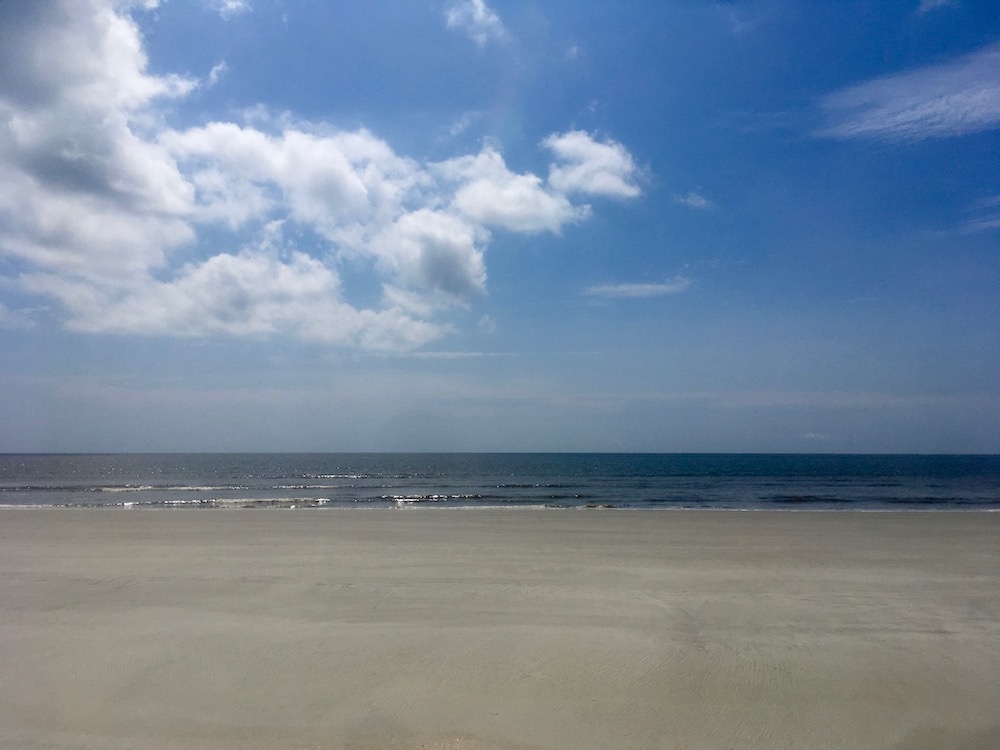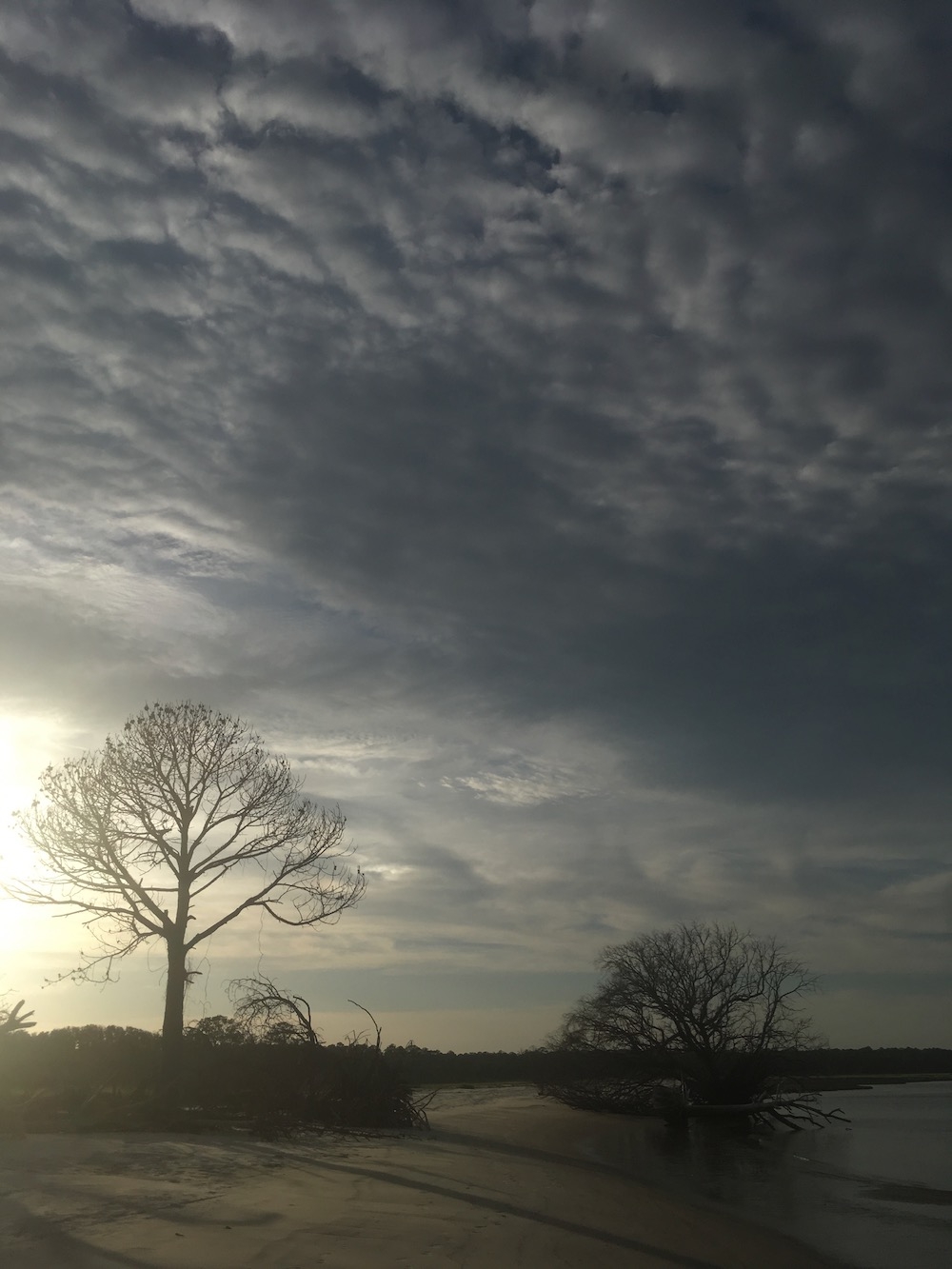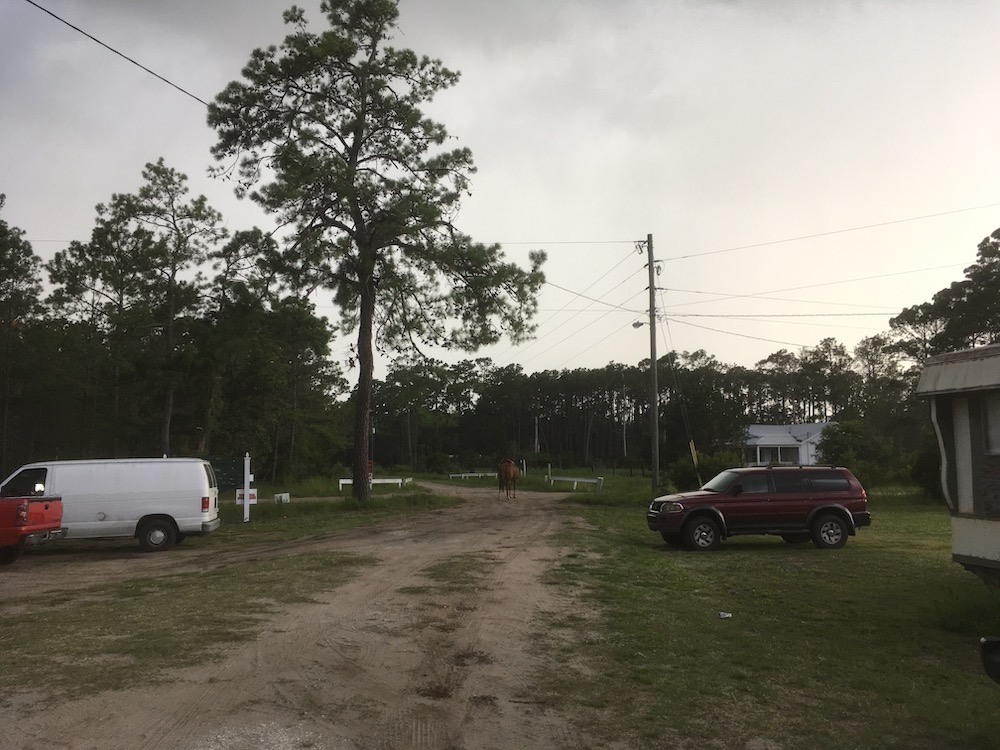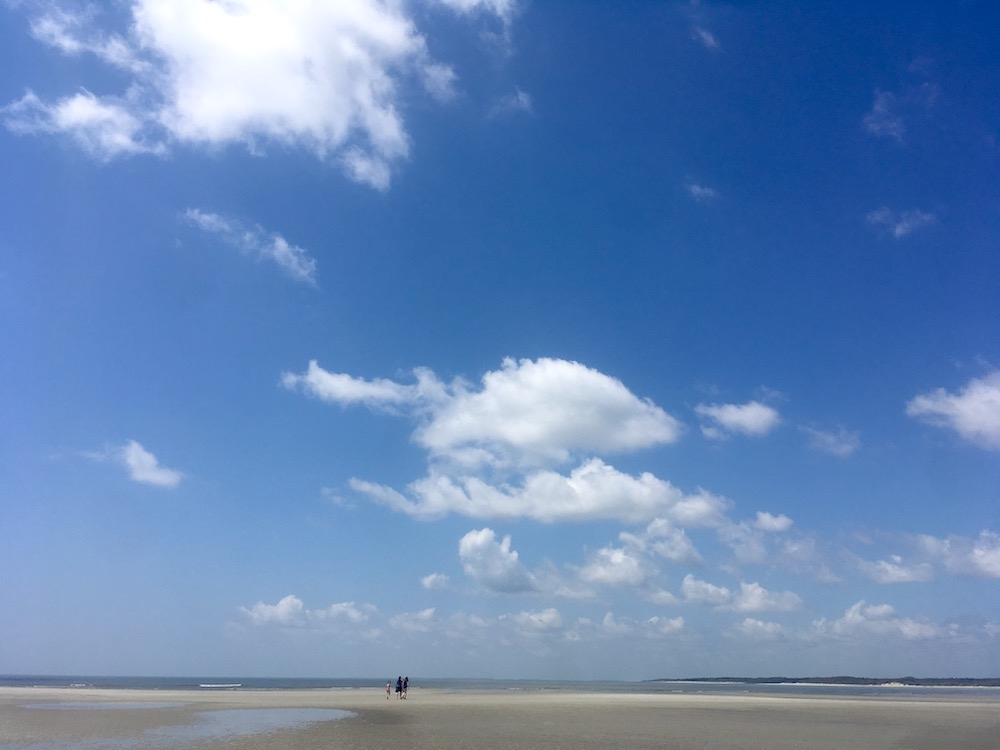We are standing in the middle of a broad, long beach. The water is as flat as the beach and beyond, sky; shades of the same color. Ground, water, sky; it all blends together.

My twelve-year old daughter is staring up, her neck cranked upwards.
“It’s so,” she says, pausing for a moment to consider the best word, “big.” The wind tousles our hair like a dad walking by. My daughter looks at me, amazement flaring in her eyes. “We are so small,” she says.
I nod. I smile back. I agree. She is having the best kind of epiphany: the obvious kind.
I grew up far from any ocean beaches, but as a Canadian the feeling of being small is familiar. I spent months of every summer vacation camping in the shadow of the towering, ancient Rocky Mountains. When you encounter something big and old like the Rockies, you’re reminded in every moment of your newness and smallness.
But here on this white sand, it’s a different kind of feeling small than in the mountains. In the mountains, I am dwarfed, all the time. It is quiet in the Mountains, quieter than other places, because unless you are at a rushing river or a waterfall, or unless the wind is strong enough to push the trees, the higher air pressure dampens all sound. Being in the Canadian Rockies is like always wearing earmuffs. Everything is subdued. Noise just drops off. And anything smaller than you is only barely smaller than you when compared to the epic size of the mountains. You are part of everything because you are small, all of it in the shadow of the mountains.
But here on Sapelo, there are many things that are noticeably smaller than us. The little white bugs who skeet across the surface that we can never catch. The bazillions of mosquitoes and sand flies that remind us of their smaller but painfully annoying existence with every bite and draw of blood. The dancing, skittling fiddler crabs en masse, who look like a big quiet something until you approach, and then the whole rock or tree or patch moves in concert. The thousands of tiny fish of all kinds that bounce off your feet in the low-tide micro tributaries, as it’s a crowded New York subway station and you’re the idiot deciding to suddenly stop. The blue crabs, whose snapping come-at-me-bro attitude works for a time until they decide enough’s enough and that sinking into the sand and ignoring it all is probably the best approach to get through it all. Or the ineptly named horse-shoe crabs who look alien and terrifying, but are actually benign and gentle, and who we all feel sorry for later when we read that we are the aliens, because just up the coast in Charleston we humans abduct these ancient creatures, systematically drain 30% of their blood in sterilized laboratories, and toss them back as if nothing ever happened, thank you very much.
When my daughter says that we’re small, what I think she means, or at least what I feel that she means here on Sapelo, is that being on Sapelo is just another part of being life in a vast intricate system of life. In the Rockies, you are small because something is big. Here we are small because there are so many small things of which we are only a part, each small thing intersecting with the other in very obvious and in many less obvious ways. Every moment on Sapelo is a meeting moment because Sapelo is a meeting place of many, many things.
It’s easy to look at any beach and say that it’ a meeting of two things, because that’s what is: water, land. But Sapelo is even more so a meeting place, of so many things. It is an intersection of manifold natural systems, all of them compounded upon the other. Sapelo, for example, is where salt-water animals will swim in, birth, and then raise and nurse their young in the moderated freshwater on the west side of the island, amongst marches that filter out the salt. Their young grow, then migrate into the seawater.

Sapelo is a place of spiritual intersection too, a place to feel God, because God is the Creator, and God created and creates Life, and Sapelo courses and bursts with life upon life, systems of life upon systems of life, systems upon systems.
With all of this life, with God so present, I feel helpless at Sapelo, though I don’t think much of it, because there’s so much to see and do. But if I stop and face into that feeling, I look down the horizon of the ocean, say, or the long stretch of beach, I am reminded that I am myself playing a role in a large system playing itself out. Everything big and small with and in a place and given a direction.
Sapelo is an old island, but, in the way that it has contained natural systems, Sapelo has similarly contained manifold human natural systems. White people enslaved and trafficked Africans to Sapelo many years ago, and while the ancestors of those white owners of human beings long since moved away, the ancestors of the enslaved remain, at least for now. Those systems persist, especially in places like Sapelo, and even though slavery as an active system is gone, the system’s legacy remains. There are now only some 50 ancestors still living on the island. The system of white supremacy has, piece by piece over time, deconstructed the infrastructure, education, business and homes of the ancestors of people who were forced to live on Sapelo against their will a long time ago.
And here we sit on the beach, five white folk, five Beeler, staring at the sky, feeling small, perhaps on the same beach that those Africans set foot on hundreds of years ago, us here at will, them against it, and at loss of of great life.
And here I am now, writing this. So, what role am I playing here, miles away in Atlanta Georgia, by writing this now? What system is at play, now? This sounds like an existential question. It is, but it’s not the kind that seems debatable in a grad school classroom. That extistentialness feels urgent, imminent when I think of Sapelo. When I stare at the sky and the water and the land of Sapelo, I wonder what choice do I have, if only to write?
I think about the enslaved that lived on Sapelo, and their great great great grand sons and daughters who live on Sapelo now. I think about how we stopped to offer one of these grand sons a ride home. “I like riding on my bike,” he said, friendly, but I read into it as a way to say, “I don’t really need you, thank you” and I agree with him both in the obviousness of the moment, and in my navel-gazing reading-into-it-ness, and we drove on.
I think about the conversation in the only store on the island, where I overheard a white woman phoning her friend to tell her that land is cheap on Sapelo, and there’s a property she should buy, and if she did, they’d then be neighbors. Though I definitely silently judge that woman, on the way back to Atlanta, my wife and I even discuss how we could live at Sapelo, buy a home for the summer, visit, live here. How easy it would be.
I think about the Sapelo fish fry we happened upon, and a white fisherman who was wearing a red MAGA-esque Brian Kemp hat, who kept making Trump jokes without recourse, because, I guess, he could, even though Sapelo residents rolled their eyes behind his back. There it is, isn’t it: systems upon systems, one of which is the privilege of my kind, of white men, to both tell and laugh at ones’ own jokes.

And thinking on all these things, all of which feel like the movements of great and great meaning of which is longstanding, these deep-wrought things, all these things that are working and at work, it holds down my spirit into the sand, like I’m caught in the mud, like a little crab who wants to close his eyes and bury into the sand and hope it just goes away.
Being there felt like watching the end of an epoch. For example:
We arrived at the north beach one morning. It’s a kind ocean marsh cul-de-sac, teeming with life. Bursting with it. There is a pod of porpoises swimming lazily 50 feet away. Fish everywhere, flipping up out of the water like shimmers. On the sandy shores are horseshoe crabs, and crabs of all kinds. Seeing and feeling all this, and being the only humans around, is such a rare experience for me, because I am almost always in a situation where humans have control of it all (or at least as much control as we can, or we think).
We go walking and find some waves; something is waving back at us beyond the waves. A sting ray? A shark? A porpoise? Something else? We have no idea. It’s big.
On the shore there are giant, old trees that have come up from the water. They are whitened by sun, and all of this adds to the surreality of the place. Sapelo can feel like another planet. It feels sacred.
We wander south.
When we come back to the cul-de-sac, there are three cheap fishing boats in the water. People in the boats. Their laughs and the music blaring from their marine stereos rises above the quiet, overwhelming it. One of the people tosses a beer can into the water. I watch the white and red can bob for a bit then take on water and sink. I think about the horse shoe crabs and the porpoises and the stingray-whatever-it-is, and the enslaved and their descendants, the systems upon systems. I’m not naive enough to fully believe that our impact is any more or less than theirs, but the brazenness of it all awakens a silent and angry judgement. They are an easy target for my condescension. I want to swim over and punch the lights out of the person that threw the can overboard.
But I don’t. Instead, I continue to judge, quietly, inwardly, grumpily, as we move along the beach. I judge them. I judge myself. I am probably closest to the can-throwing-fisherman than anything else on Sapelo; everything else is foreign, to me. In fact, I am the foreigner here, the intruder, the colonizer. My feet sink into the white sand and I want my white body to follow, to disappear like a bobbing beer can taking on water.
But I don’t follow the sand crabs example and sink into the sand. I go home, or to at least what we’re calling home but is actually the Airbnb on Sapelo owned by other white people. It’s a sweltering afternoon so we stay inside. The kids watch home improvement shows on satellite TV and my wife naps. I start to write this here thing, thinking does it do anything at all to change the systems, and I realize I’m just that beer can in the water, bobbing until I sink.
I look outside, where it is hot, and just beyond the trees is that blue sky.
